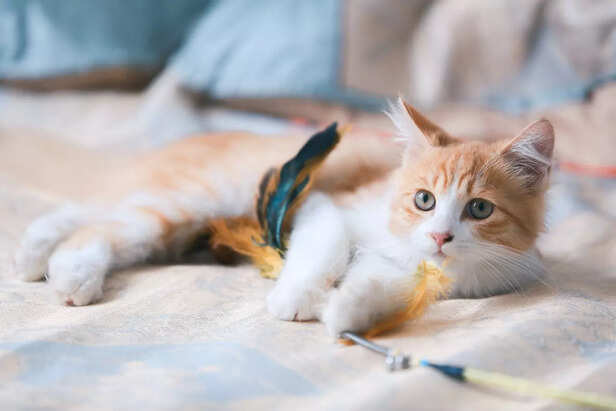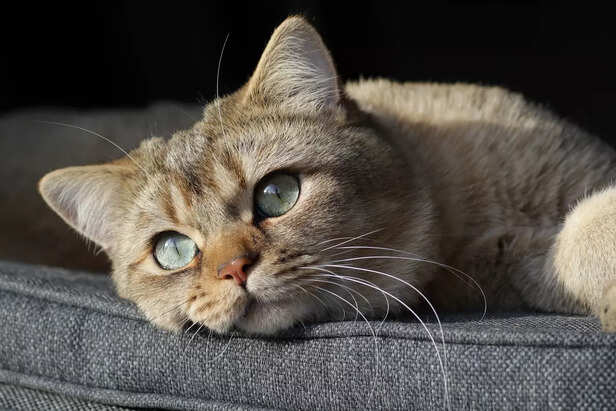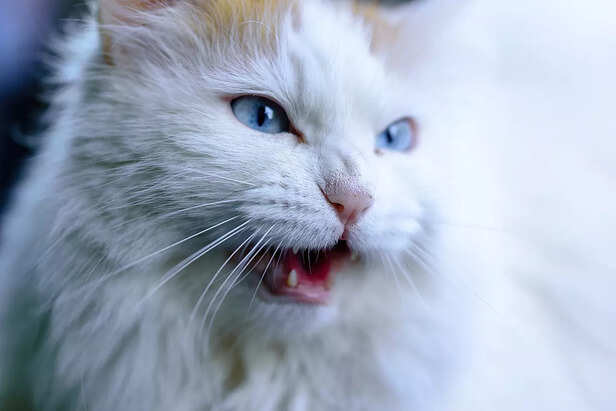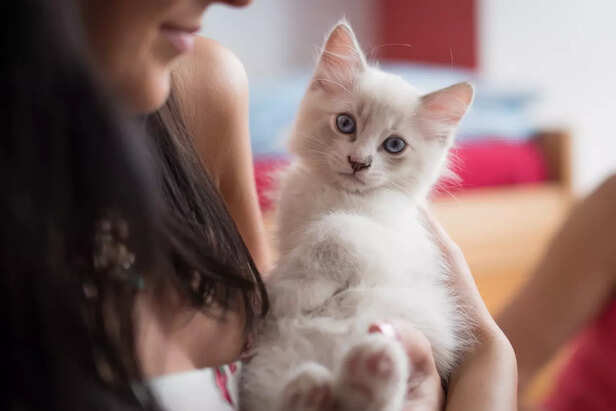Why Your Cat Might Be Smarter Than You Think – The Science Behind It
Nikita Kanyal | Feb 07, 2025, 23:22 IST
Why Your Cat Might Be Smarter Than You Think – The Science Behind It
Cats are not merely affectionate pets—they are unexpectedly clever beings with abilities that match those of dogs. With brains that are 90% alike to humans, cats thrive in areas such as problem-solving, memory, and emotional intelligence. They possess the capability to identify your voice, reflect your feelings, and even influence you with specific meows. From their talent in remembering occurrences to untangling puzzles and learning through watching, cats display astonishing mental skills. Whether they are providing comfort or outwitting you for snacks, your feline companion could very well be more intelligent than you realize.
Cats are recognized for their aloof, mysterious, and slightly self-centered temperament. Yet, don’t let those idle days lounging by the window deceive you your furry friend might be a clever genius in disguise. Recent scientific studies have revealed the remarkable intelligence of cats, demonstrating that they are far more evolved than we previously realized. So, brace yourself as we explore the hidden genius of your whiskered companion!

A cat’s brain may be diminutive in dimensions, yet it is filled with strength. In structure, it is roughly 90% alike to a human brain. Cats have around 300 million neurons within their cerebral cortex—the part of the brain responsible for decision-making, problem-solving, and learning. For comparison, dogs have approximately 160 million neurons. This suggests that, neurologically speaking, cats are equipped for complex thinking and adaptability.
Ever ponder how your cat consistently seems to outwit you regarding food or play? That’s not by chance. Cats are remarkable at solving problems. Research has demonstrated that cats can grasp cause and effect, manipulating doors or even deciphering puzzles to reach treats.
One study involved putting food within a container featuring a sliding door, necessitating cats to determine how to shift it. Not only did the majority of cats succeed, but they also recalled the solution days afterward. This capability to learn and remember information indicates they have extraordinary cognitive abilities.
The Mystery of Memory

Cats are recognized for possessing a form of memory referred to as episodic memory, which enables them to remember particular past events. For example, your cat might remember the place they spotted a mouse the previous week or the last time they were fed.
This is comparable to the kind of memory that humans utilize to remember personal occurrences. In a certain study, investigators examined cats’ capacity to remember where food was concealed in bowls. The findings were remarkable: cats could not only remember which bowls had food but also when they last consumed from those bowls, even following a few hours.
This indicates they can mentally time travel to retrieve stored information a hallmark of high intelligence. Contrary to popular belief, cats aren’t indifferent to their humans. They’re just more subtle than dogs about showing affection. Research shows that cats can recognize their owner’s voice, distinguish emotions, and even mirror your mood. When you’re feeling down, your cat might come to comfort you—not because they want food, but because they sense your distress.

Consider that your cat's meows are merely random sounds? Reconsider! Cats have evolved a distinct “language” to interact with humans. Curiously, grown cats infrequently meow to one another—it’s a trait mainly designated for engaging with people. Every cat adapts their vocal sounds to their owner's reactions, effectively “educating” you to comprehend their requirements.
A research study carried out in Sweden discovered that felines have the ability to modify the pitch and tone of their vocalizations in response to different circumstances. An elevated-pitched meow may express enthusiasm, whereas a deeper one could suggest annoyance. As time progresses, cats refine this form of interaction, establishing a distinct connection with their owners.

Ever notice how your cat seems laser-focused when playing? That’s their intelligence in action. Play is more than just a pastime for cats, it’s a way for them to hone their hunting instincts and problem-solving skills. Toys that require them to strategize like laser pointers or puzzle feeders engage their brains in ways similar to how humans solve riddles or play chess.
In fact, cats can adapt their hunting strategies depending on the prey. For example, they might stalk slowly when targeting a bird but pounce quickly for a mouse. This flexibility demonstrates their ability to plan and execute complex actions.
The tamed cat has experienced slight genetic alterations from its feral predecessors, preserving a significant portion of their innate intelligence. This characteristic contributes to the adaptability and self-sufficiency of cats. In contrast to dogs, which were cultivated to obey orders, cats have developed as solitary predators. Their intellect arose not for compliance but for survival, turning them into expert strategists.

While you’re reading this, your cat is probably plotting their next move—whether it’s securing an extra snack, claiming the comfiest spot on the couch, or getting you to play at midnight. They’re not just cunning; they’re strategic.
Here’s an example: have you noticed your cat staring at you before mealtime? That’s not random. Cats learn your routine and anticipate your actions, subtly manipulating you with their behavior. It’s like they’re running a psychological experiment on you—and winning!
Now that you know your cat is a little Einstein, how can you help them thrive? Here are some tips to engage their intellect:
Puzzle Feeders: Make mealtime a mental challenge.
Interactive Toys: Invest in toys that stimulate their problem-solving abilities.
Playtime: Regular, varied play keeps their minds sharp.
Social Interaction: Talk to your cat—they might understand more than you think!
Environmental Enrichment: Provide spaces for climbing, hiding, and exploring.
The Brainpower Behind the Purr

Brainpower (Image Source : Freepik)
A cat’s brain may be diminutive in dimensions, yet it is filled with strength. In structure, it is roughly 90% alike to a human brain. Cats have around 300 million neurons within their cerebral cortex—the part of the brain responsible for decision-making, problem-solving, and learning. For comparison, dogs have approximately 160 million neurons. This suggests that, neurologically speaking, cats are equipped for complex thinking and adaptability.
Problem Solvers Extraordinaire
One study involved putting food within a container featuring a sliding door, necessitating cats to determine how to shift it. Not only did the majority of cats succeed, but they also recalled the solution days afterward. This capability to learn and remember information indicates they have extraordinary cognitive abilities.
The Mystery of Memory

They sense your distress (Image Source : Pixabay)
Cats are recognized for possessing a form of memory referred to as episodic memory, which enables them to remember particular past events. For example, your cat might remember the place they spotted a mouse the previous week or the last time they were fed.
This is comparable to the kind of memory that humans utilize to remember personal occurrences. In a certain study, investigators examined cats’ capacity to remember where food was concealed in bowls. The findings were remarkable: cats could not only remember which bowls had food but also when they last consumed from those bowls, even following a few hours.
This indicates they can mentally time travel to retrieve stored information a hallmark of high intelligence. Contrary to popular belief, cats aren’t indifferent to their humans. They’re just more subtle than dogs about showing affection. Research shows that cats can recognize their owner’s voice, distinguish emotions, and even mirror your mood. When you’re feeling down, your cat might come to comfort you—not because they want food, but because they sense your distress.
Communication Experts in Fur Coats

Communication experts (Image Source : Pixabay)
Consider that your cat's meows are merely random sounds? Reconsider! Cats have evolved a distinct “language” to interact with humans. Curiously, grown cats infrequently meow to one another—it’s a trait mainly designated for engaging with people. Every cat adapts their vocal sounds to their owner's reactions, effectively “educating” you to comprehend their requirements.
A research study carried out in Sweden discovered that felines have the ability to modify the pitch and tone of their vocalizations in response to different circumstances. An elevated-pitched meow may express enthusiasm, whereas a deeper one could suggest annoyance. As time progresses, cats refine this form of interaction, establishing a distinct connection with their owners.
Playful Minds at Work

Playful
( Image credit : Pixabay )
Ever notice how your cat seems laser-focused when playing? That’s their intelligence in action. Play is more than just a pastime for cats, it’s a way for them to hone their hunting instincts and problem-solving skills. Toys that require them to strategize like laser pointers or puzzle feeders engage their brains in ways similar to how humans solve riddles or play chess.
In fact, cats can adapt their hunting strategies depending on the prey. For example, they might stalk slowly when targeting a bird but pounce quickly for a mouse. This flexibility demonstrates their ability to plan and execute complex actions.
The Evolutionary Edge
Your Cat Could Be Outsmarting You

Oversmarting you (Image Source : Pixabay)
While you’re reading this, your cat is probably plotting their next move—whether it’s securing an extra snack, claiming the comfiest spot on the couch, or getting you to play at midnight. They’re not just cunning; they’re strategic.
Here’s an example: have you noticed your cat staring at you before mealtime? That’s not random. Cats learn your routine and anticipate your actions, subtly manipulating you with their behavior. It’s like they’re running a psychological experiment on you—and winning!
How to Nurture Your Cat’s Genius
Puzzle Feeders: Make mealtime a mental challenge.
Interactive Toys: Invest in toys that stimulate their problem-solving abilities.
Playtime: Regular, varied play keeps their minds sharp.
Social Interaction: Talk to your cat—they might understand more than you think!
Environmental Enrichment: Provide spaces for climbing, hiding, and exploring.
Pet Picnic Spots in Indian Cities You’ve Never Heard About
By Tanisha Kumari
Rickshaw, Metro or Cab: Which Ride Do Pets Prefer?
By Tanisha Kumari
The Harsh Reality of Boarding That No Pet Parent Wants to Face
By Tanisha Kumari
Backpack Pets Are the New Fashion Statement
By Tanisha Kumari
Pet cafés & their rising popularity across India & abroad
By Tanisha Kumari
Gear Up: Top 4 Essentials for Outdoor Dog Safety
By Tanisha Kumari
Vrindavan’s Eternal Harmony, Krishna’s Friendship with Animals and Birds
By Hindveer
